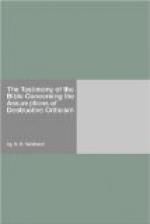To affirm that this promise of the Messiah long before his coming “would not give comfort to his people” is mere assumption. The time of his coming was not announced, and the people were to live in expectation of the event, which expectation was to be their stay and comfort. This assumption would vitiate the promise of his coming made to our first parents. Gen. iii. 15, the promises made to Moses; Deut xviii. 15, the predictions made in Psa. xxii. 1, 8, 16, 18, in which his cry on the cross, the taunt of his enemies, the piercing of his hands and feet, and the parting of his raiment among the soldiers, were all predicted.
The prediction that “Thou, Bethlehem Ephratah, though thou be little among the thousands of Judah, yet out of thee shall he come forth unto me, he that is to be the Ruler of Israel; whose goings forth have been of old, from everlasting” (Micah v. 2) was made seven hundred years before the coming of Christ, and, according to critical assumption, could not refer to our Savior, “because it would not give comfort to his people.”
Indeed, no prophecy preceding the time of Isaiah ix. 6 could be allowed to refer to Christ, on the assumption of the critic. More than this, the prediction of Christ’s second advent is vitiated by this assumption. It was more than eighteen hundred years ago that the angels said to the disciples who were steadfastly watching his ascension: “This same Jesus who is taken from you into heaven shall so come in like manner as ye have seen him go into heaven.” Was there no comfort to the disciples in the promise of his return, though they did not live to witness it? Paul, enlarging on the promises of Christ’s return, said to the Thessalonians: “Wherefore comfort one another with these words.”
Let us now consider the prophecy in its context. The prophecy of the seventh and eighth chapters is projected on through the ninth. The first verse of this chapter predicts some relief of the former sufferings of the people for their sins.
“The people that walked in darkness (verse 2) have seen great light.” The prophet informs us who it was, to whom this light should come. The inhabitants of “the land of Zabulon and the land of Nephthalim,” which embraced the region of Galilee, in which the larger portion of Christ’s ministry was exercised. Matthew quotes this scripture as fulfilled by the coming of our Savior. (See Matt. iv. 12-16.) “Now when Jesus had heard that John was cast into prison he departed into Galilee, and leaving Nazareth he came and dwelt in Capernaum, which is upon the sea coast, in the borders of Zabulon and Nephthalim; that it might be fulfilled which was spoken by Esaias the prophet, saying, The land of Zabulon and the land of Nephthalim, by way of the sea, beyond Jordan, Galilee of the Gentiles; the people which sat in darkness saw a great light, and to them which sat in the region and shadow of death, light is sprung up.”




